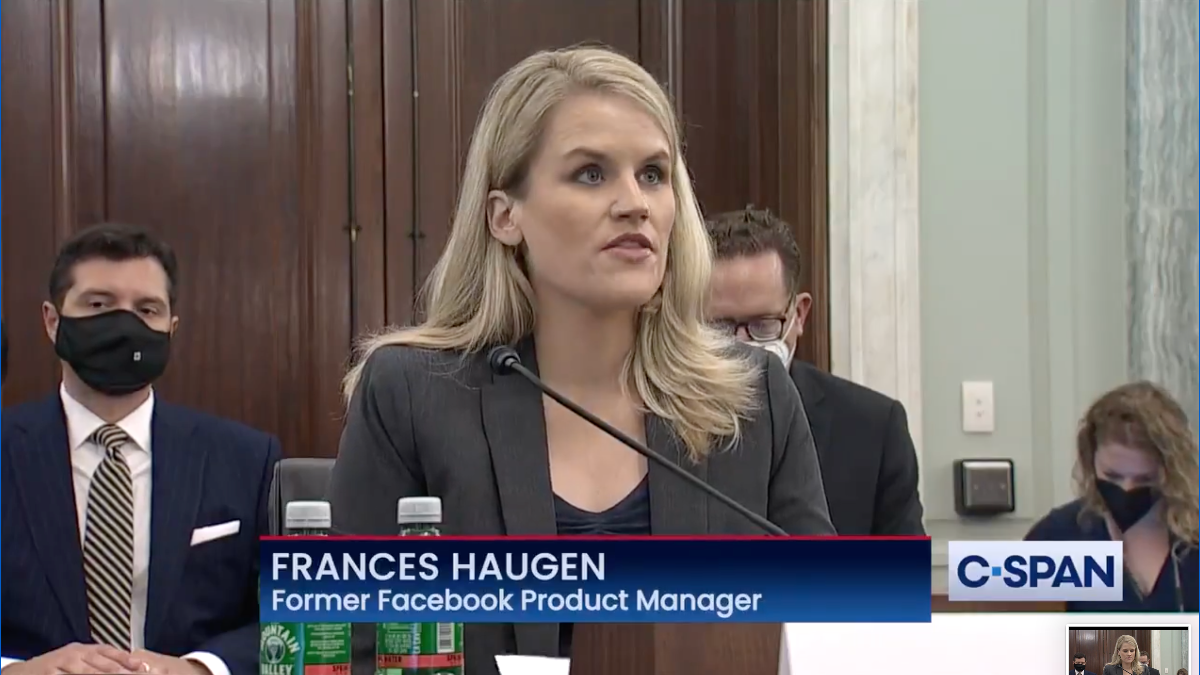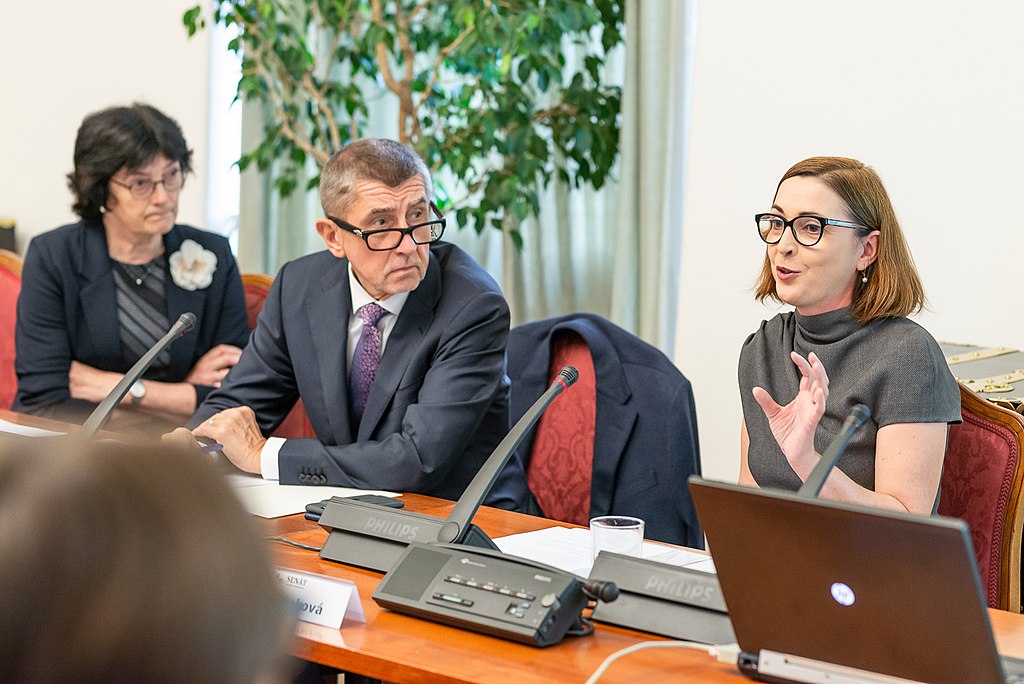Top photo: Czech Prime Minister Andrej Babiš meets with the head of the Czech Academy of Science in October 2019. (Photo: Czech Academy of Science)
Welcome to Factal Forecast, a look at the week’s biggest stories and what they mean from the editors at Factal. We publish our forward-looking note each Thursday to help you get a jump-start on the week ahead. If you like what you see, you can subscribe for free.
A look ahead:
Oct. 8/ Czech parliamentary elections: Voters in the Czech Republic will head to polls Friday to elect all 200 members to the Chambers of Deputies, with the leader of the winning party set to become the country’s next prime minister.
- What’s happened so far: Current Prime Minister, Andrej Babiš of the populist ANO party, leads the polls with 27 percent, with the center-right coalition SPOLU and the liberal-progressive Pirate Party being the most formidable opponents. Other parties represented in this election include the anti-immigration SPD party, Social Democrats and the Communist Party, with the latter two expected to not win any seats. Though President Milos Zeman has said he will appoint the leader of the winning party as prime minister, analysts expect Babiš will likely be appointed again as Zeman does not recognize the opposing coalitions as political subjects.
- The impact: Despite differences on many issues, including climate change and same-sex marriage, opposition coalitions all support EU and NATO membership. Babiš may have an option to form a coalition either with the Communist or the SPD party, the latter of which remains the most anti-migrant and anti-EU party. Babiš, meanwhile, is facing new allegations that he owns offshore accounts following the recent Pandora Papers leak.
Oct. 8/ U.S., Mexico hold high-level security talks:Mexican and U.S. officials are set to hold security talks Friday in Mexico City amid concerns about cartel violence in Mexico.
- What’s happened so far: U.S. Secretary of State Antony Blinken, Homeland Security Secretary Alejandro Mayorkas and Attorney General Merrick Garland will travel to Mexico City for a high-level meeting with Mexican Foreign Minister Marcelo Ebrard and the government’s security cabinet with the goal of reaching a new cooperation deal to fight insecurity and violence. The talks are part of a recent agreement reached between the two countries during Vice President Kamala Harris’ visit last June. According to the Mexican government, both administrations share a security vision focused on addressing the causes of violence from a new humanitarian approach.
- The impact: Successful talks and the signing of a new protocol would put an end to the Merida Initiative, a 2008 bilateral deal heavily focused on military response to drug-related violence. The deal’s efficiency has been questioned due to the sharp increase of illicit drug consumption in both countries, the escalation of violence and arms trafficking. Ebrard said recently officials are in the advanced state of finalizing an agreement, which is expected to be signed at the end of the talks.

Oct. 9/ Tesla holds Giga-Fest in Berlin: On Saturday, Tesla is set to host a 9,000-person event to showcase its new factory on the outskirts of Berlin, with local authorities expected to grant a special permission for the mass gathering amid coronavirus restrictions.
- What’s happened so far: Tesla was due to open its first European car factory in July n Grunheide, Germany, after beginning construction at the end of 2019, but it has been plagued by delays over alleged non-payments to state regulators and permitting issues. Saturday’s event, which the company said will feature special coronavirus measures, will give visitors a behind-the-scenes tour of the gigafactory, which sits 20 miles outside of Berlin. Tesla is still awaiting final approval from state regulators for the site to begin its operations.
- The impact: Tesla CEO Elon Musk, who vocally rejected lockdown measures during the pandemic, plans to attend the event. Once complete, the factory will be able to produce 500,000 electric vehicles per year at a time when electric car sales have increased significantly. One in 12 cars sold in Europe between April and June this year ran on batteries alone and sales may well increase further in the wake of the U.K. energy crisis.
Oct. 10/ Iraqi parliament elections: Iraq, reeling from almost two decades of war and U.S. occupation, will hold elections Sunday for the fifth time since the fall of leader Saddam Hussein. At stake is control of the legislative body that elects the next prime minister and president of one of the world’s biggest oil producers.
- What’s happened so far: Iraqi authorities are holding the vote almost a year ahead of schedule in an effort to restore order following mass anti-government protests that broke out in 2019, throwing the country into turmoil. Hundreds of people died in clashes with security forces, while the government grew increasingly unable to meet demands for improving services, wages and cracking down on corruption.
- The impact: Voters will select 329 lawmakers from a pool dominated by Shia politicians who favor neighboring Iran to varying degrees. Pro-Iran militias, including Hezbollah Brigades — a group classified as a terrorist organization by the United States — are vying to increase their influence against the Sadrist Movement, a populist organization that says it wants a more independent Iraq, free from intervention from Iran, Saudi Arabia and the United States.
Oct. 12/ EU-Ukraine summit: European Union diplomats will hold a summit with Ukraine on Tuesday to discuss a host of issues between the bloc and Kyiv.
- What’s happened so far: The summit comes in the midst of significant turmoil in European energy markets, in which Ukraine has long been a prominent player due to its strategic location as a transit hub for Russian hydrocarbon exports. This coincides with the pending completion of Russia’s controversial Nord Stream 2 pipeline, which will allow Russia to export gas directly to Germany through the Baltic Sea, avoiding Ukrainian transit fees and diminishing Kyiv’s leverage over its rival. Nord Stream 2 has put Ukraine at odds with some EU countries, with Kyiv adamantly opposed to the pipeline.
- The impact: Along with energy, EU and Ukrainian officials will also likely address the conflict in the Donbass region, which continues to grind on with no end in sight after over seven years of fighting. The two parties are expected to address Russia’s decision not to renew the OSCE observer mission’s mandate to patrol checkpoints along the line of contact.
Oct. 12/ NHL regular season begins: Professional hockey’s newest franchise will take to the ice for its first regular season game Tuesday as the Seattle Kraken visit Las Vegas to face the Golden Knights in the second half of a doubleheader.
- What’s happened so far: After a pandemic-shortened 2020 campaign, nearly all teams will welcome back fans at full capacity to start the season, with some instituting vaccination or negative testing requirements for entry. But plans for sellout crowds have drawn ire from some health officials in Canada, who expressed concern over the potential for the spread of the coronavirus at a time in which their healthcare system is severely strained. Meanwhile, the league said it expects only a handful of players won’t be fully vaccinated by the time the season begins.
- The impact: Commissioner Bill Daly has acknowledged that, “COVID continues to be a challenge,” but expects the league to complete the full 82-game slate — with a February break for the Olympics — and to “finish close to kind of a normal calendar for the first time in three years.”

Oct. 12/ Blue Origin tourist flight with William Shatner: Canadian actor William Shatner, best known for his role as Captain James T. Kirk in the original Star Trek television series, will head to space for real Tuesday as one of four people aboard Blue Origin’s rocket.
- What’s happened so far: Shatner will join Blue Origin’s Vice President of Mission & Flight Operations Audrey Powers and two other space tourists for a 10-minute trip aboard the New Shepard launch vehicle as it heads to an altitude of approximately 63 miles before releasing the crew capsule for a quick return to Earth. It will be the second Blue Origin flight with passengers after founder and billionaire Jeff Bezos debuted the company’s first flight in July.
- The impact: At 90 years old, Shatner will become the oldest person to ever reach space. It’s clearly a trip Blue Origin hopes will inspire other aspiring space tourists and another milestone in the space tourism industry. Still, the event will likely encounter criticism amid concerns about the environmental effects of space tourism and complaints that the cost of going to space puts it out of reach to all but the wealthy.
Oct. 12/ G20 extraordinary meeting on Afghanistan: Leaders from the world’s 20 largest economies will hold a virtual summit on Tuesday to discuss the ongoing humanitarian and economic crises in Afghanistan, which have worsened under Taliban power.
- What’s happened so far: Taliban forces advanced through Afghanistan and moved into Kabul in July, before taking control of the Afghan government after President Ashraf Ghani fled the country. The “handover” of power saw a great deal of uncertainty in one of the world’s poorest countries with more than 100,000 civilians evacuated through Kabul’s airport before efforts halted. Western powers have called on the new Taliban government to permit Afghan citizens to leave the country, a scenario that appears more likely since the Taliban-controlled Interior Ministry has begun issuing passports.
- The impact: Humanitarian issues are likely to top the agenda, with the Taliban’s track record on human rights violations, involvement with terror organizations and oppression of women expected to be key points. Despite the change in government, Afghanistan remains cash-strapped and the United States rolled back some sanctions in an effort to get humanitarian aid into the country. Economic barriers have led to a crisis in legitimate exports, such as fruit and vegetables. The G20 powers, joined by Qatar, will likely be looking for public and private assurances by the Taliban as an act of good faith before relations can be normalized.
Oct. 14/ Indonesia reopens Bali for some tourists: Indonesia’s tourist island of Bali will reopen to some countries on Thursday after more than a year of tough restrictions due to the coronavirus pandemic.
- What’s happened so far: The popular Indonesian island, with its economy deeply dependent on tourism, has been closed to foreign travelers since April 2020 after the country declared a state of emergency due to the pandemic. Last week, senior cabinet minister Luhut Pandjaitan announced people coming from China, New Zealand and Japan, among others, would be allowed to return to Bali. Visitors, however, are still required to quarantine for eight days at their own expense.
- The impact: Indonesia was one of the Asian countries most affected by the virus, with 4 million cases and 142,000 deaths confirmed. The partial lifting on restrictions in Bali will come as a relief to the economically-struggling island. In an effort to reopen the tourism sector, Bali has been striving to accelerate its coronavirus vaccination program, boasting one of Indonesia’s highest vaccination rates.
Oct. 14/ Japan prime minister expected to dissolve parliament: Newly confirmed Japanese Prime Minister Fumio Kishida announced he will dissolve the lower house of parliamentThursday, ahead of a general election set for the end of October.
- What’s happened so far: Kishida won a narrow runoff against rival Taro Kono to become leader of Japan’s ruling Liberal Democratic Party late last month, buoyed by the party’s more conservative factions despite enjoying less public support. He’s since been officially voted into office, forming a new cabinet with key posts given to close associates of previous Prime Minister Shinzo Abe.
- The impact: Kishida’s proposed date for the general election, Oct. 31, is earlier than expected, apparently in a bid to quickly secure goodwill during a decline in coronavirus cases and more optimistic sentiment toward a new government. While it’s highly unlikely the Liberal Democratic Party will lose its majority in parliament, Kishida’s performance could signal whether he’ll follow the country’s long tradition of premiers with short terms.

What else matters:
Pandora Papers leak: A trove of 11.9 million documents dubbed the Pandora Papers has exposed a network of offshore shell companies and trusts used by the rich and famous to conceal wealth and, in some cases, avoid tax. The documents were obtained by the International Consortium of Journalists and reviewed by 650 reporters in the largest global investigation of its kind. Some 35 world leaders are implicated in the leak, including Jordan’s King Abdullah II, who is accused of amassing a secret $100 million property empire, and Russia’s President Vladimir Putin, who is linked to a secret Monaco property allegedly acquired by a woman with whom he has a child.
- Watch for: Many leaders named in the leak, including President Putin and King Abdullah II, have denied wrongdoing. Czech Prime Minister Andrej Babiš, who is accused of concealing his ownership of a $22 million chateau, said the leak was designed to influence the results of Friday’s election. Governments around the world pledged to investigate the Pandora Papers, notably the U.K. after it was revealed the Queen’s crown estate paid £67 million ($91 million) to Azerbaijani President Ilham Aliyev for a London property. The leak is also likely to raise questions for President Joe Biden after the state of South Dakota was named as a leading tax haven. Anti-corruption organization Transparency International said the leak “brings home the need to rein in the lawless offshore industry.”
Facebook outage: Facebook took two major hits this week after its service went down for several hours Monday following a technical issue and a former employee testified Tuesday before a U.S. Senate committee that the company chose profits over safety. During the outage, billions of people lost their main form of communication — Whatsapp, bought by Facebook in 2014, is used to send more than 100 billion messages a day with many places around the world using it in lieu of texting due to spotty cell phone service. The day after service was restored, former employee Frances Haugen testified to a U.S. Senate committee that Facebook knew its products could damage teenagers’ mental health, spread hate and misinformation, and weaken democracy. Facebook denied the claims but agreed standard rules for the internet are needed.
- Watch for: This week could lead to meaningful legislation that curtails some of Facebook’s power. After the whistleblower testimony, senators from both sides of the aisle agreed something must be done about Facebook’s monopoly. The EU, meanwhile, is already drafting regulations targeting Big Tech.
Extended outlook: What’s on our radar in the coming weeks
Oct. 8: 2021 Nobel Peace Prize winner announced; Czech parliamentary elections; U.S., Mexico to hold high-level security talks
Oct. 9: Tesla holds Giga-Fest in Berlin
Oct. 10: Election for Iraqi Council of Representatives
Oct. 12: NHL regular season begins; EU-Ukraine summit; G20 extraordinary meeting on Afghanistan; Blue Origin tourist flight with William Shatner
Oct. 14: Giulio Regeni murder trial in Italy; New Japanese PM expected to dissolve parliament; Indonesia reopens Bali for some tourists
Oct. 15: FDA discusses Johnson & Johnson booster
Oct. 17: Cape Verde presidential elections
Oct. 18: Robert Durst sentencing hearing
Oct. 19: NBA regular season begins
Oct. 23: Rugby League World Cup in England
Oct. 24: Uzbek presidential election
Oct. 25: Trial of Metropolitan police officer charged with kidnap and murder of Sarah Everard
Oct. 26: ASEAN Summit in Brunei
Oct. 27: South Africa local government elections
Oct. 30: G20 summit in Rome
Oct. 31: Planned launch of James Webb Space Telescope
Nov. 1: South Africa local government elections; UN Climate Change Conference
Nov. 2: Virginia and New Jersey gubernatorial and Ohio congressional special elections

